Just someone with a passion for all storytelling mediums. I use this blog to write about what I'm passionate about and share it with other people.
151 posts
The Last Of Us Part II Review (minor Spoilers)
The Last of Us Part II Review (minor spoilers)
I just finished the last of us part 2 and I want to start off by saying I think everyone should give this game a shot. A lot of the spoilers are taken really out of context and I think you should play the game through and decide for yourself how you feel about the finished product.
Now to the review (there will be minor spoilers, but no big story beats will be revealed)
This game managed to take all my expectations and flip them on their head. It's a deeply moving tale about guilt, grief, revenge, and redemption and none of those came in the form that I came in expecting. I saw a lot of people upset after the leaks surfaced and deciding they didn't want to play the game, but I strongly encourage you to play this and see how it plays out in its entirety. The story hit me in a way I wasn't expecting and it is my favorite first play through experience.
I came into this game expecting a rather straightforward revenge story, but of course that wasn’t all I got. The biggest strength is that you get to play as both Ellie and Abby. You see both of their perspectives and everything that led them to this point. I can honestly say that I wanted both of them to break free of the cycle of violence and find peace. The expansion of our viewpoint is what elevates the story from very good to great. It was a bit jarring to have the viewpoint change because unlike in the Last of Us I wasn’t expecting to play a level as someone other than our main protagonist, let alone the character I initially thought of as the villain. I have never been so happy to be wrong. This shift in perspective really made me rethink everything I had done in the game as Ellie. It made it so that when Ellie and Abby fought or were close to confrontation I was worried for both of them. I didn't want either to lose or win over the other. And, without getting into anything, it made it so that the ending was so much more impactful. I don’t know if I’ve been that invested in the final section of gameplay in any game I’ve played before except for maybe the first game. The Last of Us Part II is a game I won’t forget.
-
 transmascguts liked this · 5 years ago
transmascguts liked this · 5 years ago -
 vivailragu liked this · 5 years ago
vivailragu liked this · 5 years ago -
 mclovin-boudicca-blog liked this · 5 years ago
mclovin-boudicca-blog liked this · 5 years ago -
 soluslupus11 liked this · 5 years ago
soluslupus11 liked this · 5 years ago -
 bestofbonus reblogged this · 5 years ago
bestofbonus reblogged this · 5 years ago -
 bestofbonus liked this · 5 years ago
bestofbonus liked this · 5 years ago -
 leikal liked this · 5 years ago
leikal liked this · 5 years ago -
 emowitch92 liked this · 5 years ago
emowitch92 liked this · 5 years ago -
 glitchygutz liked this · 5 years ago
glitchygutz liked this · 5 years ago -
 roleplayinheaven liked this · 5 years ago
roleplayinheaven liked this · 5 years ago -
 whyarewewlwlikethat liked this · 5 years ago
whyarewewlwlikethat liked this · 5 years ago -
 valyriaas liked this · 5 years ago
valyriaas liked this · 5 years ago -
 thankonomics liked this · 5 years ago
thankonomics liked this · 5 years ago -
 iwantcaaake liked this · 5 years ago
iwantcaaake liked this · 5 years ago
More Posts from Battlekidx2
Breaking Free of the Vines - Telling an Emotional Journey Through Music

The music starts out sad and loud while the vines are covering her. She is still fighting and the music becomes louder the more of her allies get taken by the vines while she still fights.

It quiets as the fight in Adora starts to die down and it almost completely goes away once Adora gives in and says “I can’t do this on my own”.



The music is still soft, but it shifts to Angella’s leitmotif and flashbacks to her sacrifice and everything that came after. Angella’s sacrifice is a huge motivating factor in this season and, while for most of the season it has been a source of Adora and Glimmer’s rift and respective spirals, in this moment Adora is realizing she can’t let it be in vain. Adora can’t give up on the people she cares about or herself because Angella’s last speech to her was about how Adora is the one who inspired her not she-ra and that it is Adora who makes she-ra a hero not the other way around. It’s Adora finally realizing what Angella really meant with her final speech instead of her guilt clouding her interpretation.

The music grows in volume and turns triumphant when Adora snaps out of it and overcomes the signal to transform and save her friends. The music isn’t she-ra’s theme. It’s Adora’s theme because, while Adora does transform into she-ra in this moment, Adora’s own will is what overcomes the vines not she-ra’s power.
Breaking Down Catra’s Breakdown in Fractures
I really love Catra’s breakdown scene. Every shot has a purpose and meaning behind it and so does the music. I don’t think there was a wasted moment.
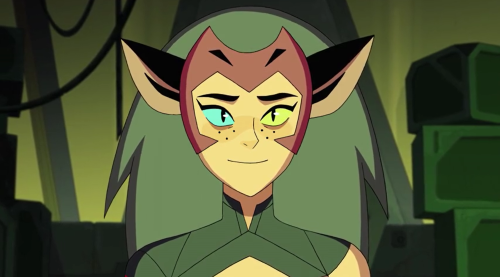
It starts on a closeup shot of her face making sure we can’t really see her surroundings and it’s clear from the get go that her smile and words don’t completely match up with how she feels by the obvious bags under her eyes. There’s more going on here.
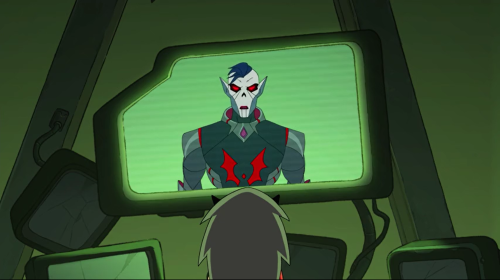
Then it cuts to a shot of the screen with Hordak on it. There is a small screen in the lower left corner that is cracked once again hinting at everything not being “under control”. The cracks in Catra’s facade are becoming harder to hide from the people around her and the full extent of her deteriorating mental state is hidden from the audience.
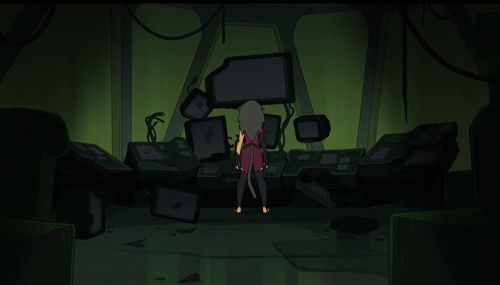
The transmission ends and immediately the camera zooms out to reveal all of the destruction around Catra. The music swells to what is a sinister note then fades to a quieter decidedly more tragic tune. The full extent of Catra’s emotional decline isn’t shown until Catra is completely alone. Catra is framed rather small in comparison to the large, destroyed room. Her pain is bigger than she can handle and everything is starting to become collateral.
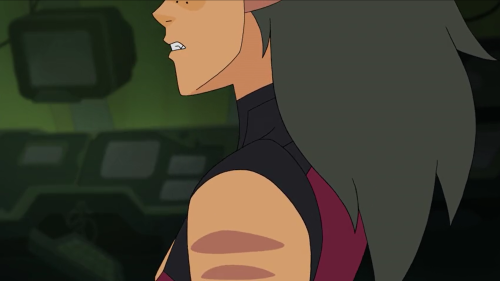
The shot changes to a closeup view once again but this time it’s of Catra’s profile from the middle of her chest to the bridge of her nose, her eyes are out of frame. Catra removes her mask right now both literally and metaphorically, but we still can’t see her eyes. Her full emotions aren’t completely clear yet. We’ve only seen the destruction and anger.
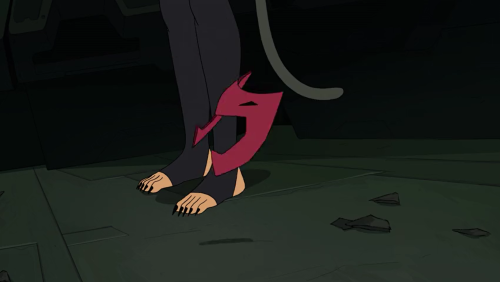
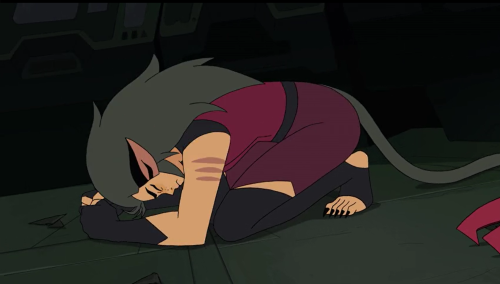
The mask falls to the ground and Catra quickly follows. She falls to her knees with her head bowed to the ground and starts crying.
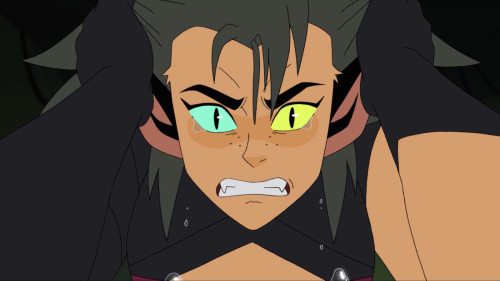
It cuts to her face and we finally get to see her eyes again and all we can see is her emotional anguish. The sad/tragic music swells as Catra’s breakdown continues mirroring the outpouring of emotion. It went from soft when Catra initially removed her mask and the more Catra’s facade slips the louder the music gets until the facade is completely gone and the music crescendos. The shot is a close up, nothing else is in frame. Catra is so alone and in denial that her real feelings, the sadness and pain, can’t be seen by anyone else. She makes sure that it can’t be seen by anyone else. All anyone else will see once this is done is the outward destruction.
This whole scene is so powerful from the framing, to the music, to the dialogue, to the animation. Everything about this scene is amazing. It’s framed so tragic. This is Catra’s low point. She is hitting her rock bottom.
I know comparing redemption arcs to Zuko’s has been done to death, but I think it’s fascinating how similar the buildup to Catra and Zuko’s redemption arcs are.
There’s the very obvious connection that both suffered abuse at the hands of a parental figure growing up and a lot of their actions are driven by their desire to get recognition/affection from said parental (and also in Catra’s place authority) figure. Catra is almost convinced to leave the horde and live a life in the waste similar to how Zuko was considering abandoning his mission to capture the avatar in season 2 and live in Ba Sing Se. They change their mind because of someone close to them giving them information about said parental figure. With Catra it was Adora telling Catra that shadow weaver went to the rebellion/went to Adora and for Zuko it was Azula saying that their father was eagerly awaiting Zuko’s return. Which leads them to making a decision that almost destroys the heroes. Zuko siding with Azula in the crossroads of destiny and Catra pulling the lever to open the portal. They get everything they thought they wanted, Zuko being welcomed back and Catra almost winning the war and gaining power, only to discover how hollow it feels and become even more angry and confused before getting the final push they need to do the right thing. They also both make poor decisions when trying to alleviate their inner conflict, Zuko hiring combustion man and Catra forcing everyone away from her. Their decision to start their redemption is driven by the revelation about how they really feel about the positive influence in their life. Zuko realized that his Uncle Iroh was right about what he should do and that he was lying to himself by thinking Iroh meant little to him after he betrayed his Uncle when Iroh was truly the most important person in his life. Catra realizes she has been lying to herself this whole time about hating Adora and realizes she can’t let Adora be killed because of her actions/inaction because she actually loves her.
These connections were why I came out of season 4 very sure that Catra would be redeemed and I’m really glad it happened. Redemption arcs are my favorite trope in media. This is probably been done, but I like looking at the connections.
The Tragedy of Dororo (2019) - Finding the “Lack”
I just finished watching the 2019 anime adaptation of Dororo and with the final confrontation between Hyakkimaru and his father as well as the revelation that follows I was struck with how utterly tragic the story was. Daigo realizes that Hyakkimaru was supposed to grow up to be a great ruler and bring about the prosperity and peace that he desired and his deal with the demons actually destroyed the possibility of that lasting prosperity.
All of the suffering that we saw the characters go through could have been avoided. In the end no one was really right. Everyone lacked something that prevented them from making the right choices. For Daigo it was patience and faith, for Hyakkimaru it was his body and understanding, for Tahomaru it was love and support. Every choice made by the characters was driven by their “lack”. And it wasn’t until they understood their “lack” that they were able to see what they truly needed to do, or in Daigo’s case what he should have done. It all becomes clear in the end, but by that point everything has literally and metaphorically burned to the ground.
Hyakkimaru’s journey was especially poignant after that revelation (at least to me). We see his struggle from start to finish, we see him come to care for Dororo, we see his humanity, but we also see his lack be the driving factor for his “inhumanity”. In the episode “Story of the Nue” we see how far Hyakkimaru has come when he gets Dororo food and wants to hear all of her stories. At this time he has found something he cares about more than getting his body back, but throughout the course of the episode we also see how that new care and love can also drive his descent. He is increasingly desperate to save Dororo and can’t because of the limits of his prosthetics which shatter with the effort. This is a sort of breaking point because before he didn’t have a real reason to get his body back other than just wanting it because he believed it would fill his lack, but now he has a driving factor. To get his body back so that he can protect Dororo which leads to his intense desperation and breakdown when he doesn’t receive anything for defeating the Nue. Dororo started to fill Hyakkimaru’s lack. Hyakkimaru mistakenly believed that his lack was his missing body, but in reality it was his connection to people and his understanding of others. Once he makes that connection and is able to see others for what they truly are “human” instead of “others in his way” he is able to become the man he was destined to be.
The connection between what Hyakkimaru believes to be his lack and what really is his lack is interesting. Hyakkimaru not being able to understand others and how they are all like him (human) stems from his lack of a body and senses, but it is his fundamental misunderstanding that getting his body back won’t fix his lack that makes his quest misguided.
The tragedy and pain that Hyakkimaru felt could have been avoided if Daigo’s lack was something different, but because of it he was forced through this crucible and the people were left without the leader that was meant to bring them prosperity.
The story of Dororo is fascinating because of this. What could have easily been adapted as the tale of Hyakkimaru valiantly fighting through his handicaps to take down the evil demons and his irredeemable family (like the original manga) was turned into a much more tragic tale where everything is in shades of grey and the theological ideas of the time period were addressed with much greater thought. Dororo is a story of filling the lack within ourselves and that it sometimes doesn’t happen until it's too late. This struggle felt very human and hit me harder once it was all over.
On a side note: I highly recommend this series. I was glued to the screen from start to finish and really hope everyone gives it a chance.
Star Wars the Clone Wars (2008) Thoughts and Review
With season 7 of the clone wars fast approaching I decided to give the series a second shot. The first time I started watching star wars the clone wars I dropped it. I am so glad I gave it a second chance. I watched it chronologically this time around which made a significant difference in the experience. The first time I watched it the show felt incredibly disjointed with characters who had died much earlier suddenly getting introduction episodes and the timeline was all over the place with closing episodes for arcs happening before opening ones. I couldn’t understand why so many people liked this show that was so all over the place, but now that it’s been a few years and there are many lists on how to watch it chronologically returning for the show seemed like a must. This is a truly great cartoon with amazing writing, animation, and characters. It’s a deeply tragic tale where the heroes don’t win every battle. You know the outcome and yet you can’t help but be enthralled by everything that happens. The show becomes steeped in grey the longer it moves along and decidedly doesn’t deal with the absolutes of black and white, light and dark. This show managed to blow me away even though I came in having heard all the praises that were thrown its way. I highly recommend that anyone who hasn’t watched this show go out and start right now.
Animation:
There was a rather large jump in animation quality in season 4. That’s not to say the animation before wasn’t impressive just that it became even better. The character animation is where it was most noticeable. I wasn’t a big fan of Count Dooku or Chancellor Palpatine’s character models at the start, but after the animation bump they were much better. From the clothes, to the hair, to the facial expressions. The character models for everyone were much better. The hair moved now! All jokes aside the clone wars seems to have an endless well of finances for the animation. There were so many different planets and character models utilized throughout the show’s run that there’s no other way they could pull it off. (It was rather famously financed by George Lucas) Considering the last season was released in 2013 I can easily say the animation still looks better than a lot of shows today. I had heard that the animation was good, but I wasn’t quite prepared for how good.
Standout Arcs:

Landing at point rain - This is the episode that really hooked me and made me think this show was something special. There were losses and the plan didn’t go the way our characters wanted. Obi Wan was struck out of the sky and put out of commission because of his injuries. The large scale battles and 3 separate storylines following the 3 generals were all juggles very well and, while not the morally nuanced storytelling that the Clone Wars became known for, it was still a well made war episode that showed the grueling nature of it and what was the start of what was to come.

Padawan Lost arc - This arc made me realize how much I loved Ahsoka. Not saying I didn’t like her before just that I hadn’t realized how much I had grown to love her character. These episodes did a good job of showing Ahsoka’s growth and how capable she was without her lightsaber, master, or army. The intercutting of the discovery of the other taken padawans that were never searched for with the council telling Anakin not to look for Ahsoka, but to trust in the force shows the disconnect that the Jedi council was beginning to have even with its own order. It shows that their rules against connection was, in a way, pushing them away from the light. This was the beginnings of showing how the order has lost its way. I found myself worrying over Ahsoka and her well being. I wanted her to succeed and come out the other side with the other “prey”. Which was an excellent juxtaposition to the council. Ahsoka lets her attachments help her protect the other prisoners and they get to escape because they act as a unit disproving the council’s decisions on connections. It’s fascinating that an arc that seemed at first to be disconnected to the main theme of the series became intertwined with it. I really like how the clone wars can turn your expectations on its head.

The Umbara Arc - What can I say about this arc that hasn’t already been said. Wow, just wow. This arc is incredible and showcases everything that makes the clone wars great. The animation in this four episode arc is phenomenal and some of the best 3D animation I’ve seen put on TV. The clone wars excels at showing large scale fights and this is no different. It was a marvel to look at. There were so many dark themes that were within this arc. The clones having to come to grips with the corruption of their leader and their own ability to choose despite how horrible the choices they are left with are. The revelation that they were shooting on their own troops in “Carnage on Krell” was harrowing and my shock mirrored that of the clone troopers themselves. The betrayal and hurt that all the troopers were feeling was clear as day and the realization at what they had to do to Krell, a leader they were programmed to trust, not only foreshadowed order 66 but also showed that casualties of war aren’t just people but also beliefs and worldview. The growth that the clones, especially Rex and Fives, underwent was amazing. These two became some of my favorite star wars characters with this arc. Fives with his staunch beliefs that he and all clones should stick to what they believe to be right and Rex with his realization that his loyalty and programming were misplaced, that everything that he believed and fought for may have been a lie and corrupt all along. We’ve seen the senate treating the clones like objects and products, but to see the reality of it on the battlefield was a different experience entirely. When they took Umbara it didn’t feel like a victory for the clones or to me. It felt hollow and saddening. We know how this all ends and having the clones humanized in such a way makes everything that happens later all the more hard hitting. This arc was truly great and it alone makes watching the clone wars worth it.
I also really like how it was a reversal of order 66 with the jedi general betraying his clones. It showed that clones banding together can take down even a prepared jedi, alibi an overconfident one. The conflicting emotions that the clones go through when disobeying their orders opens nuance to order 66 and their possible refusal to carry it out. The struggle of going against their programming is at the focus of this arc. The eventual retcon of this struggle by having the control chips in their brain is simultaneously something I don’t like and something I think makes sense. I don’t like it because it removes the implications and possibility to disobey the order on the clone’s end, but it also would be poor planning on Palpatine’s part to let everything hinge on the clones obeying their programming and not question it. The chips also lead to some of my favorite episodes with fives discovering order 66. This doesn’t effect my love of this arc I just wanted to voice my opinion on this point.

Darth Maul Ascendant arc and the Lawless - This arc was phenomenal. I don’t know what to say. I loved just about everything about this arc. From Darth Maul and his revenge against Obi Wan to the fall of Mandalore by its own hands. This arc was beautifully tragic. Nothing went right in this arc for anyone. Obi Wan couldn’t save Satine, Bo Katan couldn’t save Mandalore, Maul couldn’t save his brother or himself. The most popular shot from the episode “The Lawless”:

Perfectly encapsulates how futile and (once again) tragic this episode is. Obi Wan is just a silhouette against the backdrop of explosions and fighting. He’s so insignificant and small. He can’t win. He can’t save Mandalore. No matter how hard he tried. He’s just one person in the middle of this mandalorian civil war. This entire arc is filled with shots and scenes that are like this one, beautiful to look at and yet portraying immense tragedy. And I think this juxtaposition was intentional. You can’t take your eyes away despite all the horrible things happening before you. I think these episodes were some of the best animated content I have ever consumed. There are quite a few clone wars arcs that make me feel this way, but I think this is my favorite or at the very least contains my favorite episode in “The Lawless”. It is easily something I will never forget.
Ahsoka on Trial - This arc is masterful in how it juxtaposes Ahsoka and Anakin’s journey’s. Both have to deal with their disillusionment with the jedi order and the perceived lack of trust the order places in them. With the ending shot (shown below) of Anakin and Ahsoka foreshadowing through lighting the path their choices will bring them down. Ahsoka has a lit up sky behind her while Anakin has the looming, dark jedi temple behind him. Ahsoka continues down the stairs into the light having turned her back on the growing darkness within the jedi order and tentatively towards a path we cannot see but has at least some brightness and hope. While Anakin is stuck going back to an order he doesn’t have faith in feeling like he has failed his task in protecting Ahsoka. This arc is what the show felt like it was culminating towards with Ahsoka. We knew something was going to happen that would take her out of Anakin’s life before the events of Revenge of the Sith, but the way this played out was better than I could have imagined. I couldn’t help getting emotional over Anakin and Ahsoka parting ways and knowing how Anakin’s story plays out just added to my sadness over it all. There is also a very interesting parallel between Ahsoka and Ventress. They are both force wielders that were betrayed by the order that they followed and seeing their interactions after all this time was fascinating. I also couldn’t truly argue with Barriss when she voiced her reason for attacking the jedi temple. We’ve seen through all our main characters the shortcomings of the jedi and the corruption within the senate that the jedi work with. What Anakin says in Revenge of the Sith “From my point of view the jedi are evil” suddenly makes so much more sense after watching this series and especially this arc. This managed to add so much to the prequel trilogy, at least in my opinion.


Fives and Order 66 - I can’t believe the show decided to show someone actually discovering the truth behind order 66. I was rooting for fives throughout this entire arc and was shocked and sad to see he died so close to getting out the truth (despite knowing that he wouldn’t succeed). I had grown very attached to fives with all the episodes he was a part of and liked how his sense of duty was to doing what was right and saving as many lives as he could showing how despite the clones being programmed they all had different interpretations of their programming. This arc showed how capable the chancellor was at covering his tracks. He had a hand in every event that transpired during this series and yet has everyone fooled in one way or another. No one really knows the truth about him. After the episode “Orders” I had to pause the show, sit back, and let what had just happened sink in (like with many other episodes). How could this show tell storylines that I knew were doomed to end only one way and yet still completely emotionally invest me? And I think that question is just a testament to how good this series really is and how good this arc is.

I will say that easily the weakest episodes to me were the ones focusing on the droids such as R2D2 and C3PO. I like them as support characters, but their spotlight episodes were a slog to get through and I probably won’t rewatch any of them. The good news is that these are far and few between, but there is an arc with them in season 5 that I’m not too fond of especially since the rest of season 5 was phenomenal. There were also a few senate based episodes I struggled through, but most of them I was interested by because of how you could see the corruption and how the senate themselves had begun to see the war as a chance to profit and saw the clone troopers as disposable, easily renewable weapons. It was at times fascinating.
Characters:

Ahsoka - I love Ahsoka Tano. I’ve heard that she wasn’t well received upon her introduction. I’m not entirely sure why because I didn’t have a problem with her in the clone wars movie. She wasn’t my favorite, but she had a lot of room to grow and I wanted to see what they would do with her. The very premise of Anakin having a padawan is fascinating to me because while we know what she isn’t around for revenge of the sith we don’t know why. Is she killed? Does something drastic happen that removes her from the story? Does she stay a jedi or fall to the sith? These were all possibilities and thoughts that I had when I started watching the clone wars. I made sure to stay away from spoilers because I like it when I get to watch something unfold. Ahsoka’s arc is fantastic. We get to see her transform into an idealistic, overconfident youngling to a calm and confident jedi. She, like Obi Wan and Anakin, goes through trials and sees her faith is the Jedi order shaken. The disillusionment and what paths it takes them all on is really interesting. Unlike Obi Wan who still wields and believes is the light side or Anakin who wields and falls to the dark Ahsoka becomes something in the middle, not light or dark. They all portray the different paths that their disillusionment can take. Ahsoka’s decision to become something in the middle echoes the sentiment that you should not deal in absolutes, which is a message within the series. Ahsoka’s decision to leave the Jedi order and forge her own path is what I feel the story was always culminating towards with her. This is why I’m excited for Ahsoka vs Darth Maul in season 7. They are both former apprentices that were betrayed by the order that they had sworn their loyalty towards, but while Maul focuses on vengeance and continues down the path of the dark side, Ahsoka focuses on the future and taking her own path separate from the light or dark. They are perfect opposites to one another in how they dealt with their similar situations. Ahsoka is the perfect example of the idea that the power doesn’t matter, it’s what you do with it. She chooses to still do what she knows is right despite not wielding the dark side. I’m really happy that she survived the series and the empire’s reign. I can’t wait to see what they do next with her.

Obi Wan Kenobi - I really liked what they did with him in this series. We got to see how his emotions did clash with his rigid adherence to the jedi code. His most telling moments were in his greatest failures. Even in the darkest times he didn’t lose hope. He continued to believe that a better future was possible in spite of all of his loss. And I think that is admirable. Because we are so often given characters that are either overly idealistic or overly pessimistic and I can understand both of these archetypes, but Obi Wan has seen the worst of people and lost so much and yet he still maintains hope and I think that is powerful. It may also be because I am a huge fan of Obi Wan. But his hope also has its downsides even within the show because it extended to his belief in the jedi order and their code. It prevented him from being with the one he loved and creates a divide between him and Anakin where they can’t really see eye to eye. The dynamic between him and Anakin is amazing and made my rewatch of Revenge of the Sith and their battle within the film so much more heartbreaking. Obi Wan is a character that has to do something and help where he can, much like Anakin, but where Anakin is brash and reckless Obi wan is calm and diplomatic. They are set up as amazing foils to one another. I just love how much this show fleshed out Obi Wan’s character and showed more to him than the movies got to. This show did a fantastic job with Obi Wan and made his transformation from who he is in the prequels to who he is in the original trilogy make much more sense. (I highly recommend SUPER FRAME’s review of this show. I really agree with his thoughts on Obi Wan in this show)

Anakin - Anakin is a character that unlike Obi Wan I wasn’t the biggest fan of coming into this series. I didn’t hate him, but I much preferred his Darth Vader counterpart. This series changes this and I now like Anakin much more and find his fall to the dark side to be just as fascinating as his life as Darth Vader. We get to see that he really does want to save everyone and how his attachment and possessiveness lead to him doing horrible things even from the very beginning to protect those he cares about. His protectiveness becomes closer and closer to possessiveness as the series progresses. This is most noticeable after Ahsoka leaves the order and Padme decides to work with Clovis. Anakin is controlling and demands/orders her to not work with Clovis. He tries to take away her choice in the matter. This is eerily close to who he is in revenge of the sith even if it is just for a moment before it gets shoved back down. All of these moments (once again) make his turn in Revenge of the Sith very believable because it’s clear that he can be capable of the things he does in that film and onwards. He was always teetering on the edge and he just needed a push to start his descent. The tragedy of Anakin Skywalker actually became a tragedy.
This entire show seems to be a story of disillusionment, of loss, of tragedy. What starts out to seem like a tale of triumph and valor is revealed to be a facade for the bleak reality that is war. Even the “good guys” have lost their way. Time and time again we see the council and senate make decisions that aren’t what would be considered the right thing to do. The senate looks at clones like products. Disposable, reorderable weapons to wage a war that they themselves are safe from as long as they stay on Coruscant. The Jedi order has lost their way. They are no longer peacekeepers, but weapons and warriors that perpetuate war by siding with the republic. They can’t help planets like Mandalore because they side with the republic, planets that tear themselves apart and are their own worst enemy. They are supposed to help the people and the further into the war they get the less people they can protect and the more people that die. The clone wars is known to be a tragic tale where neither side wins and both were manipulated. This show perfectly captures the tragedy. I couldn’t help, but understand Barriss’ scorning remarks about the Jedi Order by the end of the series while still sympathizing with Anakin, Ahsoka, and Obi Wan’s desperate attempts to do what is right in spite of their terrible circumstances.
There is too much about the show that I want to talk about and this could probably continue for much longer, but I can’t endlessly add to this if I want to get it out before season 7 airs. There were some fantastic arcs like the mortis arc that I didn’t talk about and that’s because I wasn’t sure where to start with them. I would like to maybe later come back once I find the words and talk about them. I found this show got better with almost every season with season 5 being the best, especially since almost every episode was in the correct order. There were many highs within the series and it managed to expand a lot on the Star wars world, characters, and mythos. I liked how they brought Maul back and what they did with Ventress. Maul was something that easily could have gone wrong and Ventress is a character they easily could have just written off or killed. These are two risks that I felt paid off and there were many more. It took risks and managed to effectively comment on the justification and morality of war. It has arcs I find to be some of the best I’ve seen in animation and left me awestruck. I cannot wait for the 7th season. I’m so glad this show is getting the opportunity it deserves to end properly and tie up its loose ends. I will watch the episodes as they drop and I hope everyone who reads this will as well.
(I apologize if some of this seems jumbled. I think I may have a concussion so writing this was a bit more difficult that it should have been)
